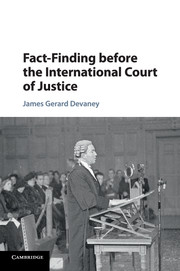Book contents
- Frontmatter
- Contents
- Table of cases
- Acknowledgements
- Introduction
- 1 Rules of evidence before the International Court of Justice
- 2 Criticisms of the Court's current reactive approach to fact-finding
- 3 The practice of other international courts and tribunals
- 4 Winds of change: the possibility of reform
- 5 A more proactive approach to fact-finding
- Epilogue
- Bibliography
- Index
Epilogue
Published online by Cambridge University Press: 05 September 2016
- Frontmatter
- Contents
- Table of cases
- Acknowledgements
- Introduction
- 1 Rules of evidence before the International Court of Justice
- 2 Criticisms of the Court's current reactive approach to fact-finding
- 3 The practice of other international courts and tribunals
- 4 Winds of change: the possibility of reform
- 5 A more proactive approach to fact-finding
- Epilogue
- Bibliography
- Index
Summary
The central argument of this book, that taking a more proactive approach to fact-finding will enable the Court to address a number of current weaknesses in its approach to fact-finding, is not merely academic. The proposals advocated in Chapter 4 are designed to be capable of implementation by the Court in practice. Inspiration for these reforms is drawn from the practice of other inter-State tribunals and it is important to remember that today the ICJ is just one of several means for settling inter-State disputes. Furthermore, jurisdiction remains largely consensual in international law and as such it is necessary to consider how the proposed reforms, and the resulting more proactive approach, could affect the appeal of the Court to States deciding how they wish to settle an inter-State dispute.
Due to the popularity of the WTO Adjudicatory Bodies and the renaissance of inter-State arbitration (as well as continued use of more traditional fora) there is more inter-State dispute settlement today than ever before. Although not all inter-State arbitrations are conducted in public, there now exists a large body of international practice upon which to draw. The practice of the WTO Adjudicatory Bodies and inter-State arbitrations illustrate that more proactive tribunals do not necessarily provoke a defensive response from States in order to protect their own sovereignty, by, for instance, resisting requests for information or simply refusing to appear. In fact there appears to be no discernable connection between a tribunal taking a more proactive approach to fact-finding and non-appearance or non-compliance. Of course, the possibility remains that the increased visibility that comes with being a party to a case before the World Court would prompt States to behave differently, but in the absence of any evidence to support such a suggestion, until a more proactive approach is taken such speculation as to the reaction of States will inevitably remain just that: speculation. Consequently, the Court has reason to be bold in pursuing a course of action that the evidence presented in Chapter 3 suggests could address a number of fact-finding problems that it currently faces.
Throughout the preceding chapters other inter-State tribunals such as ITLOS and the international criminal tribunals were referred to in relation to a number of discrete areas, most often to provide context or a point of comparison in relation to the argument being made.
- Type
- Chapter
- Information
- Fact-Finding before the International Court of Justice , pp. 254 - 256Publisher: Cambridge University PressPrint publication year: 2016



